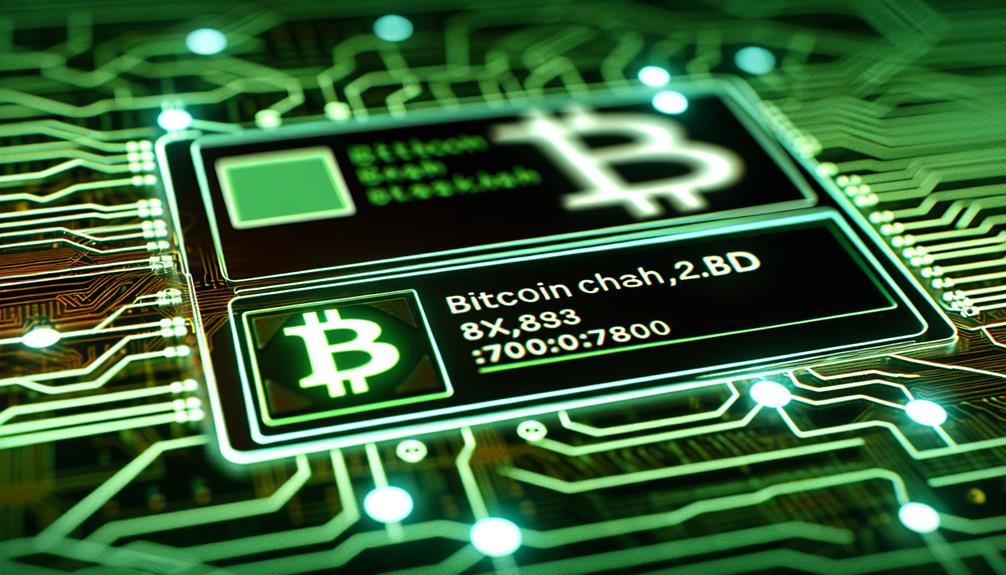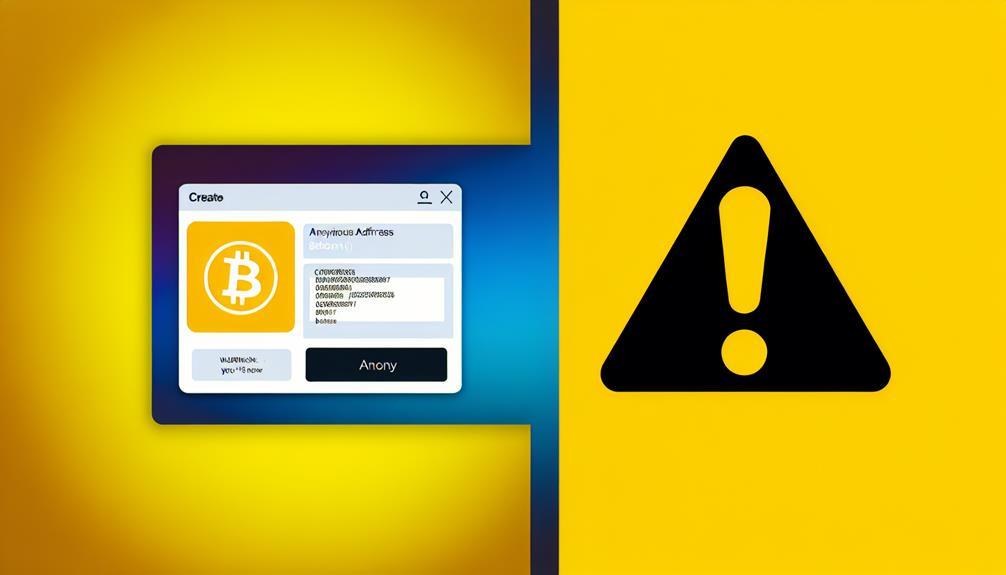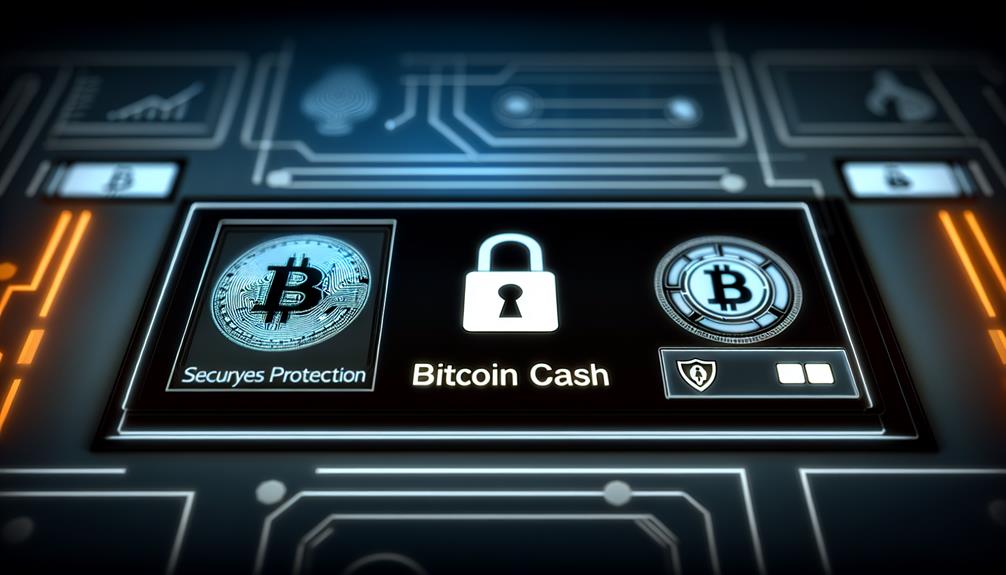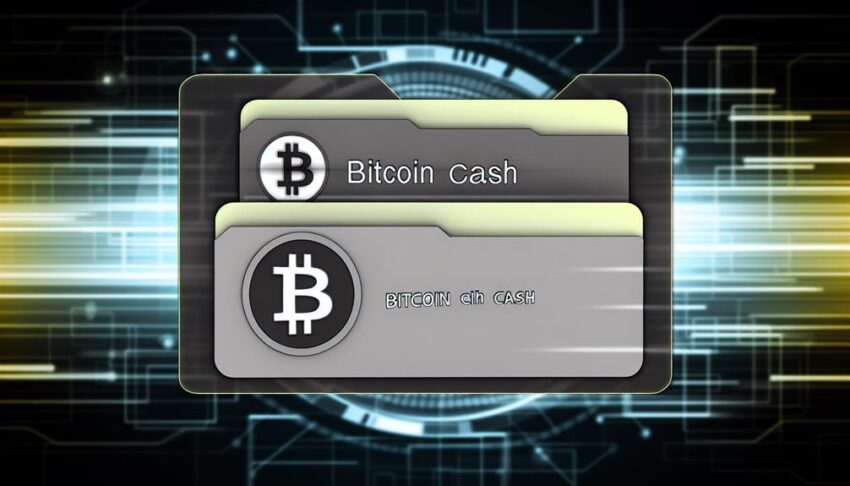Did you know that using the correct address prefix can greatly reduce the chances of transaction errors in Bitcoin Cash? While it may seem like a trivial detail, omitting this prefix can lead to complications that could jeopardize your funds. You might be wondering why this matters so much, especially if you've never encountered issues before. Understanding the nuances of address formats is essential for anyone engaging in cryptocurrency transactions, and the implications of your choices might surprise you. So, what should you consider before deciding whether to include that prefix?
Importance of Address Prefix

When it comes to Bitcoin Cash transactions, understanding the address prefix is essential. The prefix plays a significant role in ensuring proper address formatting, which can directly impact wallet compatibility. Bitcoin Cash addresses can begin with different prefixes, typically "bitcoincash:" for cash addresses or "1" for legacy addresses. Knowing which prefix to use is important, as using the wrong one can result in failed transactions or lost funds.
When you're sending or receiving Bitcoin Cash, your wallet software relies on the prefix to determine the address type. If you attempt to send funds using an address that your wallet doesn't recognize due to an incorrect prefix, it may lead to errors or even failures in the transaction process. This is especially important when you're interacting with different wallets or exchanges, as some may only support specific address formats.
Moreover, as Bitcoin Cash continues to evolve, the significance of using the correct address prefix grows. Keeping up with updates in wallet compatibility is essential. Ensuring that your wallet supports the address format you're using can save you from potential issues. As a result, before initiating any transaction, double-check that you're using the correct prefix that aligns with your wallet's compatibility.
Understanding Bitcoin Cash
Understanding Bitcoin Cash requires a grasp of its foundational principles and technical specifications. Bitcoin Cash (BCH) emerged as a fork from Bitcoin in 2017, aimed at providing faster transactions and lower fees. This cryptocurrency addresses scalability issues seen in Bitcoin, making it an appealing choice for users and merchants alike.
When exploring Bitcoin Cash, it's important to take into account the various wallet types available. These can range from hardware wallets for enhanced security to mobile wallets for convenience. Each wallet type offers distinct advantages depending on your needs. Additionally, transaction fees are a fundamental aspect; BCH typically boasts lower fees compared to Bitcoin, which can greatly impact your overall transaction experience.
Examining network differences reveals that Bitcoin Cash supports larger block sizes, which allows for more transactions per block. This scalability feature is essential as adoption trends continue to grow within the cryptocurrency space. As more businesses accept BCH, understanding these nuances becomes crucial for users.
The table below summarizes key attributes of Bitcoin Cash:
| Feature | Bitcoin Cash (BCH) | Bitcoin (BTC) |
|---|---|---|
| Block Size | 32 MB | 1 MB |
| Average Transaction Fee | $0.002 | $1.50 |
| Wallet Types | Hardware, Mobile | Hardware, Mobile |
| Adoption Trends | Increasing | Stable |
| Cryptocurrency Exchanges | Widely Supported | Widely Supported |
In essence, understanding Bitcoin Cash involves recognizing its advantages and how they align with your cryptocurrency goals.
Risks of Omitting the Prefix

Omitting the prefix in Bitcoin Cash addresses can lead to significant risks, primarily related to transaction errors and loss of funds. When you exclude the prefix, you might inadvertently create an address that's incompatible with wallets expecting the standard format. This lack of address compatibility can result in transactions that either fail to process or, worse, disappear into the void, leaving you unable to recover your funds.
User confusion also arises when prefixes are omitted. Different cryptocurrencies often employ similar address formats, and without the prefix, it's easy to mistake a Bitcoin Cash address for one belonging to another cryptocurrency. This can lead you to send Bitcoin Cash to the wrong address, potentially resulting in permanent loss. Even if you think you know the recipient well, the risk of human error increases when there's no clear indication of the asset being used.
Additionally, wallets that don't recognize the address format may treat it as invalid, causing frustration and wasted time. Your transactions could get stuck, leading to unnecessary delays and confusion. In a space where speed and accuracy are paramount, such complications can be detrimental.
Transaction Confirmation Issues
Transaction confirmation issues can arise from several factors, including the omission of address prefixes. When you send Bitcoin Cash without the correct prefix, the transaction may not be recognized by certain wallets or exchanges, resulting in delays. This can lead to uncertainty about whether your funds have been sent or received, creating a frustrating experience.
One of the primary causes of transaction confirmation issues is network congestion. During peak times, the Bitcoin Cash network may experience a surge in transactions, causing a backlog. When this happens, miners prioritize transactions with higher fees, which means that your transaction could take longer to confirm if it's not adequately incentivized. If your transaction is stuck in the queue due to insufficient fees, you may observe significant transaction delays, further complicating the situation.
Additionally, the absence of the correct address prefix can exacerbate these delays. If your wallet misinterprets the address or fails to process it altogether, your transaction might not even enter the network, leading to confusion and potential loss of funds. To mitigate these issues, always double-check the address you're using and include the appropriate prefix. This practice guarantees that your transaction will be processed efficiently, minimizing the risk of confirmation delays due to address errors or network congestion. By being meticulous about these details, you can enhance your overall experience with Bitcoin Cash transactions and avoid unnecessary complications.
Security Considerations

While you might prioritize speed and convenience when using Bitcoin Cash, security should always be at the forefront of your mind. The choice of address format can notably impact your security posture. When opting for a Bitcoin Cash address, consider the implications of address compatibility with various wallets. Using an address format that isn't widely supported can lead to potential loss of funds. If someone sends you Bitcoin Cash using a different address format, those funds may become inaccessible.
In addition to address compatibility, wallet functionality plays an essential role in guaranteeing your transactions are secure. Some wallets may have limited support for different address types, which can create vulnerabilities. Verify that your wallet can handle the specific address format you're using, as this will help minimize the chances of sending funds to the wrong address or encountering transaction failures.
Moreover, be cautious about sharing your address. Even if you feel comfortable with a certain transaction, revealing your address indiscriminately can expose you to security risks, such as phishing attempts or unwanted scrutiny. It's wise to use unique addresses for different transactions to maintain privacy and reduce the risk of your address being targeted.
Ultimately, when dealing with Bitcoin Cash addresses, balancing convenience and security is vital. Always double-check address compatibility and wallet functionality to safeguard your assets and guarantee a smooth transaction experience.
Best Practices for Address Sharing
When sharing your Bitcoin Cash address, adopting best practices can greatly enhance your security and privacy. First, be mindful of the address format you're using. Bitcoin Cash supports multiple address formats, including legacy and CashAddr. Each format has its own advantages and disadvantages, but using CashAddr can reduce the risk of errors during transactions. It's designed to be more user-friendly, which is especially critical when sharing your address with others.
Next, consider wallet compatibility. Not all wallets support every address format, which can lead to issues if someone attempts to send you funds using an incompatible format. To avoid this, share your address only from wallets that are widely recognized and have a reputation for high compatibility. This way, you're ensuring that recipients will be able to send funds without encountering problems.
When sharing your address, use secure communication channels. Avoid public forums or unsecured platforms where your address could be exposed to potential threats. If you must share it in a less secure environment, consider using a QR code for added privacy, as it minimizes the chances of someone manually copying and misinterpreting it.
Frequently Asked Questions
What Is the Difference Between Bitcoin and Bitcoin Cash Addresses?
Bitcoin and Bitcoin Cash addresses differ mainly in their formats. Bitcoin uses P2PKH and P2SH formats, while Bitcoin Cash utilizes CashAddr. These variations can impact transaction security, affecting how you manage your cryptocurrency holdings.
Can I Send Bitcoin Cash to a Bitcoin Address?
You can't send Bitcoin Cash to a Bitcoin address; they aren't compatible. Doing so jeopardizes transaction security, risking loss of funds. Always verify you're using the correct address type for your intended cryptocurrency to avoid issues.
How Do I Generate a Bitcoin Cash Address?
To generate a Bitcoin Cash address, you'll need a compatible wallet. Confirm you select the correct address formats, as wallet compatibility varies. This guarantees seamless transactions and prevents any potential loss of funds during transfers.
Are There Fees Associated With Using Bitcoin Cash?
Using Bitcoin Cash can be like sailing a boat; sometimes, you'll encounter rough waters. Transaction fees can vary based on network congestion, so it's wise to check current conditions before making any transactions.
What Wallets Support Bitcoin Cash Transactions?
For Bitcoin Cash transactions, various wallet types support them, including hardware, software, and mobile wallets. Make certain you're choosing a reputable wallet for ideal transaction security, minimizing risks such as hacks or unauthorized access to your funds.
Conclusion
In the world of Bitcoin Cash, including the address prefix is like securing the lock on your front door—it's crucial for safeguarding your funds. Without it, you risk complications and potential loss. By always using the correct prefix, you enhance compatibility and guarantee smoother transactions. So, when sharing your Bitcoin Cash address, remember to include that important prefix; it's your first line of defense against errors and mishaps in the digital currency landscape.
